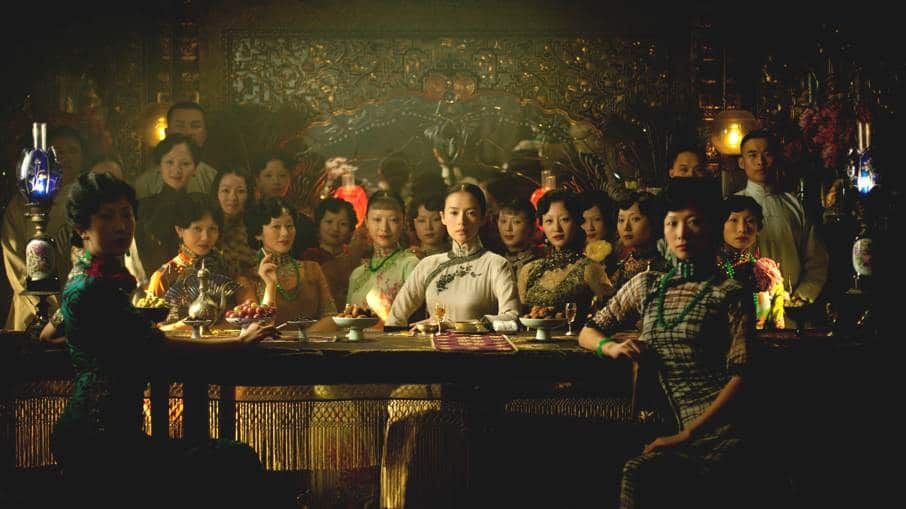There are misgivings even during the opening scene of this decade-straddling epic about Ip Man, generally described as “the man who trained Bruce Lee”. There’s legendary martial artist Ip Man (the impassive Tony Leung) in a stylish straw hat taking on a phalanx of uglies in a torrential nighttime downpour. Slo-mo rain. It’s the sort of visual cliché you might expect from Uwe Boll rather than one of the most gifted film-makers in the world.
But, a bit of plot. The film kicks off in the 1930s when, Leung’s voiceover tells us, Ip Man is about 40, a content, wealthy resident of Foshen with a lovely wife and a rich cultural life. This is all kicked into the air after a bake-off between competing branches of kung fu called by the retiring Master Gong, who has in tow his beautiful, skilled and icy daughter Gong Er (Zhang Ziyi, of Crouching Tiger fame) and wayward disciple Ma San (Zhang Jin). Over the intervening years the Japanese invade, the nationalists come and go, and the era of Mao begins, with Gong Er and Ma San both re-appearing in Ip Man’s life like punctuation marks.
Why is Wong Kar Wai making a biopic about Ip Man, whose story has already been told many times before (notably by Donnie Yen in two films)? I suspect it’s his attempt to outdo Crouching Tiger, Hidden Dragon. And maybe in the original four hour edit it does. But in this incomprehensible two hour ten minute edit (Wong says he will “never” release the original version) little makes sense, and Wong’s choices always tend towards the visual rather than the dramatic. In short, half the time it’s difficult to know who everyone is.
There are two distinct ways of shooting physical action in movies. When it’s people who know their stuff, say Donnie Yen or Fred Astaire, the camera stays back, letting the viewer take in the spectacle – real bodies doing really amazing things in real space and time. When the actors don’t know their stuff, say Bruce Willis or the cast of Chicago, then the smoke and mirrors of the edit suite takes over.
Leung trained for 18 months to do this movie, but even so is no grand master. Wong reciprocates with an ingenious shooting style that is a little bit Astaire, a little bit Willis. And he comes up with something that does actually work: impressionistic blurs of movement, fast edits and swivel pans pausing periodically to focus on a decisive tactical moment – often a “push” move of the hands or feet. It’s very effective and, now and again, breathtaking.
Wong stages these fights in locations that are chocolate boxy in the extreme – a lush high end brothel, a station wreathed with locomotive smoke, a snowy landscape.
But never mind all that, the martial arts fans will be saying, who did the fight choreography? The answer is Yuen Woo-Ping, of Kill Bill and The Matrix fame, and Yuen does put on some mighty fine shows, though I was often not sure who Ip Man, or Gong Er, was fighting, and why – except when the two leads fought each other and all was abundantly clear. This was chop-socky courtship.
With this romantic Ip Man/Gong Er strand Wong is aiming specifically for the withheld love vibe of In the Mood for Love, his most famous film, which he also tried to re-bottle in his Blueberry Nights. And it doesn’t work here either, this time because Wong has introduced Ip Man’s wife early on and then not clearly explained the nature of their relationship. Or maybe all was explained in the four hour version. And who is this guy Razor who pops up here and there, spoiling for a fight? Again the four hour edit might have the answer.
But never mind all that, Wong appears to be saying in his editing decisions, look at all the pretty pictures. In this he’s directly in the tradition of David Lean after his work jumped the shark (about halfway through Lawrence of Arabia) when his visual eye started to get the better of his storytelling brain.
This is a heroically beautiful film but a godawful mess in all other respects. I followed it up with Lav Diaz’s epic Filipino masterpiece Norte, the End of History – a four hour epic I sat through with my eyes glued to the screen. Did Wong Kar Wai not trust audiences with the full banquet? Perhaps he should think again.
The Grandmaster – Watch it now at Amazon
I am an Amazon affiliate
© Steve Morrissey 2014

